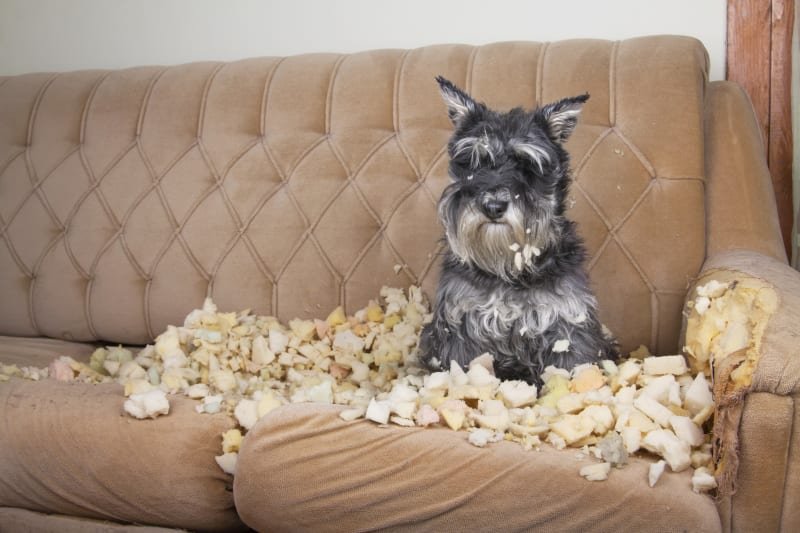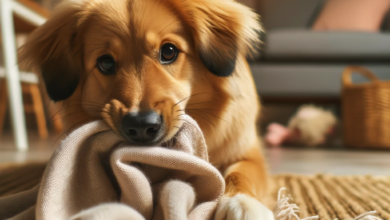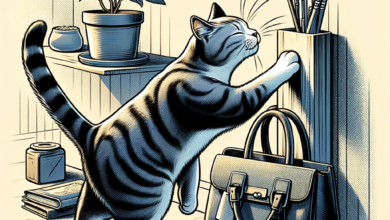Why does my dog chew on stuff when i’m gone ?
How to train your dog to stop chewing on stuff

Ever come home to find your favorite pair of shoes or the arm of your couch chewed beyond recognition? If so, you’re not alone. Many dog owners grapple with the perplexing behavior of their furry friends chewing on things when left alone. In this exploration, we delve into the canine psyche to unravel the reasons behind this common yet sometimes frustrating habit.
Why does my dog chew on stuff when i’m gone ?
Understanding Canine Behavior
The Nature of Instincts
Dogs are not just our loyal companions; they are creatures driven by instincts honed through evolution. Chewing, in particular, is deeply ingrained in their DNA, serving both practical and psychological purposes. Understanding the roots of this behavior is the first step toward addressing it effectively.
Communication Through Chewing
Beyond a mere habit, chewing can be a canine form of communication. Dogs may resort to chewing when experiencing stress or anxiety. Observing their behavior and decoding these signals is crucial in fostering a strong, understanding bond between you and your pet.
Separation Anxiety: The Culprit Within
Defining Separation Anxiety
Picture this: you leave for work, and your dog is left alone. If your belongings are transformed into a makeshift chew toy by the time you return, separation anxiety might be at play. We explore the signs and implications of this common canine ailment and its direct link to destructive chewing.
Impact on Chewing Behavior
Chewing becomes a coping mechanism for dogs dealing with separation anxiety. Understanding the depth of their emotional response can guide you in implementing strategies to alleviate their distress.
Boredom and Lack of Mental Stimulation

Active Minds, Active Paws
Dogs, by nature, are active and intelligent beings. When left to their own devices without mental stimulation, they can quickly become bored and resort to destructive behaviors, including excessive chewing. Discover the art of keeping their minds engaged to prevent the mischievous aftermath of a boring day.
Consequences of Insufficient Stimulation
Boredom manifests in various ways, with chewing being a common outlet. Explore the consequences of a lackluster environment and learn how to transform your home into a haven of entertainment for your four-legged friend.
Teething and Dental Health
A Puppy’s Dental Journey
For puppy parents, understanding the teething process is pivotal. Chewing during this phase is not mere mischief but a natural response to teething discomfort. We explore the delicate balance between addressing their pain and preserving your favorite belongings.
Importance of Appropriate Chew Toys
Not all chewing is created equal. Learn about the types of toys that can soothe teething puppies and keep adult dogs happily occupied, steering them away from your prized possessions.
Environmental Enrichment: A Panacea for Boredom
Interactive Solutions
The key to curbing destructive chewing lies in enriching your dog’s environment. We unravel the secrets of interactive toys, puzzle feeders, and other strategies to transform your home into a playground that keeps your pup engaged and satisfied.
Creating a Stimulating Environment
Discover how simple adjustments to your dog’s surroundings can make a world of difference. From rotating toys to introducing novel activities, find inspiration for turning your home into a stimulating haven for your canine companion.
Positive Reinforcement and Training
Reward-Based Solutions
In the world of dog training, positive reinforcement is a game-changer. We explore how rewarding good behavior and redirecting destructive tendencies can shape your dog’s habits, fostering a harmonious relationship even when you’re not around.
Collaborative Training
Implementing positive reinforcement isn’t just about your efforts; it’s a collaborative process between you and your furry friend. Discover the joy of training sessions that strengthen the bond and minimize unwanted behaviors.
Seeking Professional Help: When to Consult Experts
Veterinary and Behavioral Perspectives
When the battle against destructive chewing becomes overwhelming, seeking professional help is a wise choice. We explore when to consult veterinarians and animal behaviorists, and the potential treatments that can bring relief to both you and your canine companion.
Collaborative Approach
In complex cases, a collaborative approach involving both professionals and dedicated owners can yield the best results. Discover the power of teamwork in understanding and addressing your dog’s chewing habits.
Conclusion
As we conclude this exploration into the mystery of why dogs chew when left alone, remember that patience and understanding are key. By comprehending the roots of this behavior, implementing positive strategies, and, if needed, seeking professional guidance, you can transform your home into a haven where your dog is happy, stimulated, and less inclined to turn your belongings into chew toys.



